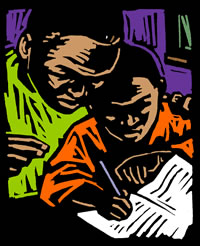
4th Sunday in Ordinary Time Year C
The theme of today’s liturgy is the role of the prophet. Prophets have always had an important place in the life of the Church. This comes as a surprise to most people – probably because they think of prophets as those who predict future events: something that rarely happened. Prophets are people who – because they are in tune with God – help us to see things as God sees them. They point out the way God is calling us to follow, and remind us of the future God has in store for those who trust in him. At Vatican II, it was recognized that the important contribution such people can make has been neglected in the life of the Church in recent centuries. Every healthy Christian community has its prophets; we should be grateful for them and open to what they have to contribute to our life together. As Vatican II has told us, we are all called - through our baptism - to share in Christ’s role as the Father’s great Prophet.
The first reading from the prophet Jeremiah reminds us of the importance of the prophets of the Old Testament. In tune with God’s ways, they called the people and their rulers to recognize these ways and to live by them. Jeremiah knew that he was called to a difficult role. His life was in constant danger, and he knew great suffering, because he answered God’s call. We are all called to stand up for the ways of God. Down through the ages, even to our own day, many Christians have given their lives because they knew that they were called to challenge the world’s selfishness and blindness.
Jesus - sent to give his witness to the ways of his Father - was the greatest of all prophets. In the end, he gave his life for the truth he brought to the world. In today’s gospel reading from Luke – a continuation of the passage we heard last Sunday – we see Jesus sharing in the kind of experience many have had, as they have tried to build up the life of a small, closed community. When they heard him speak, the people of his village were filled with surprise and admiration at first; but they found it hard to accept the new role Jesus had assumed – why had he ministered in rival towns before coming to them? In the end, however, Jesus experienced the violent reaction Jeremiah had known. As he challenged them to broaden their horizons and recognize that God’s blessings to be given to the gentiles, their mood changed, and they came close to lynching him. It is obvious that this took place when the ministry of Jesus was well established. However, Luke begins the story of the ministry in Galilee with this incident because it provides a kind of summary of what is to follow – the Good News of God’s generous ways is rejected by the people of the Synagogue, who seek his death. Luke may well, in the mysterious escape of Jesus, be foreshadowing the final triumph of the Resurrection.
Today’s familiar reading from St Paul to the Corinthians is a splendid complement to our main theme. Having ‘the gift of prophecy’ and an ‘understanding of all the mysteries’ will achieve nothing if it is not inspired by love. Nothing opens the way to the hearing of a challenging message more effectively than an approach full of good will - if faith, hope and love are the constants in the shared life of the Church, ‘the greatest of these is love’.
John Thornhill sm

